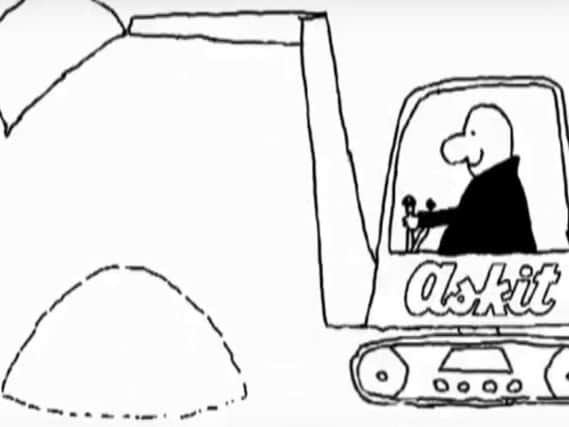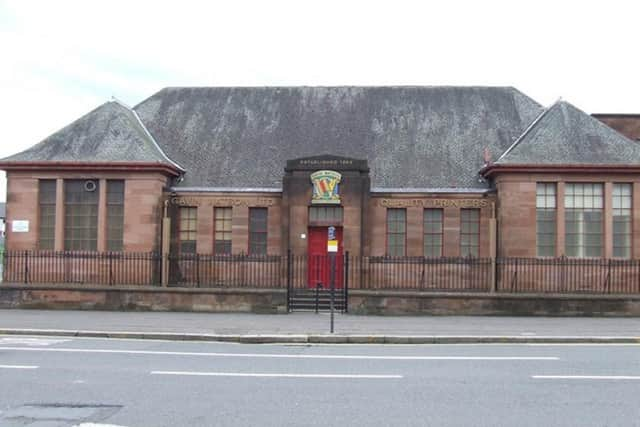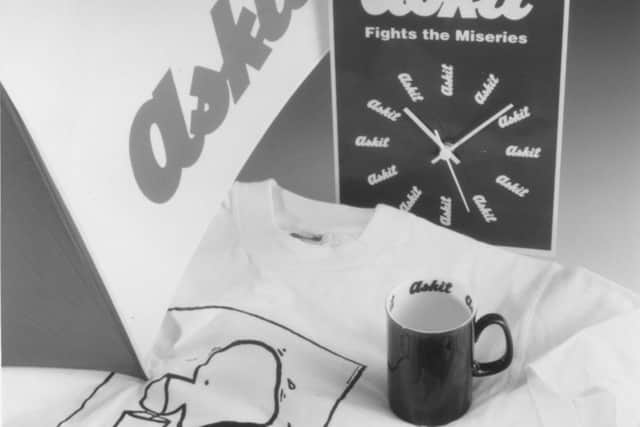Askit: The pure Glasgow painkiller that soothed the pain of the world


What is perhaps lesser known is that Askit was made in Glasgow and mixed up in apothecary shop run by chemist Adam Laidlaw and his wife in the north of the city from the early 1900s.
The name too is strictly Glasgow and was chosen after Mrs Laidlaw heard a conversation in a chemist shop between two girls.


Advertisement
Hide AdAdvertisement
Hide Ad"If it’s the lady chemist, I’ll ask it, if it’s the man chemist you ask it,” one of the girls supposedly said.
The name stuck and it became a case of 'Askit Tonight' - Tomorrow Alright'.
Askit became part of everyday life for some with an often aggressive marketing campaign helping to normalise the use of the drug that mixed aspirin, phenacetin and caffeine and promised fast - and sometimes 'magical' - results.


One man who later became addicted to the drug said he had been to friends' houses where the sachets were passed around with the tea and biscuits.
By 1920, demand for the remedy led to the Laidlaws building a laboratory in Saracen Saracen Street in Possilpark.
It employed 40 people with the smell of the mini chemical plant lingering in the memory for some.
Journalist and author Harry McGrath, whose grandmother lived in Saracen Street, earlier wrote how the factory "periodically emitted a headache-inducing smell that stimulated a market for its own product".
The laboratory also had its fair share of break ins. Newspaper reports from 1932 detailed how four men - Charles Kobb , Francis Gordon , William Melly and Thomas Poole - were caught 'red handed' trying to steal more than 22,000 powders from the premises, a haul worth around £15,000 at today's prices.
Advertisement
Hide AdAdvertisement
Hide AdThe men received between twelve months to two years of hard labour following the attempted raid.
By 1940 the company was employing around 40 people with output then boosted significantly by a marketing campaign to target ex-pat Scots living overseas. One million powders were dispatched to Canada alone in the first wave of transatlantic sales.
An advertisement in The Scotsman in 1950, which was made to look like a newspaper report - detailed how 4,800 powders were sold on their first day in Toronto alone with a Glasogow-born distributor, Peter MacPherson, employed in the city to secure sales.
The advertisement said: "Last month Askit Ltd announced that a large consignment of Askit Powders, in special wrappers and packets, were on their way to Canada to help with the dollar headache here and to meet a real demand from Scots over there .
"This ready response confirms that thousands of Scots and those of Scots ancestry in Canada have quickly sought the old familiar family friend for the safe , speedy relief of headaches , neuritis , colds , 'flu . and nerve pains .
"For a long time many Askit Powders have been sent out by friends here in response to requests by Scots in Canada but now you can tell your Canadian friends that supplies are available at the local drug store or to contact the Canadian distributor, Glasgow-born Peter MacPherson ."
Readers are then advised to spread the word and then cut out the ad an enclose it with the next letter to family and friends.
From 1971 to 1994, the company ran a hugely successful ‘The Askit Miseries’ based on drawings by creator of the Mr Men books Roger Hargreaves.
Advertisement
Hide AdAdvertisement
Hide AdThe "Miseries" campaign was replaced by ‘The Wee Man’ in 1997.
Askit, by then operating out of Cumbernauld, was bought by Roche before being taken over by German pharmaceutical giant Bayer in 2006.
Problems with the powders were by then emerging.
Phenacetin, a pain reliever used in Askit, was banned in the US in 1983 given concerns over its potential links to kidney damage and cancer.
In Scotland, drug counsellors in Scotland reported psychological addiction the drug with one case involving a woman who took 24 powders a day. Withdrawal symptoms, such as headaches and shivers, amongst those who took high dosage were also noted with users taking more to combat their ills.
One counsellor said: “They are young mums who grew up seeing older generations swallowing Askit and older people who’ve taken it all their life."
Askit Laboratories always stressed that the risk of dependence to the powders was low.
In 2018, Taggart star Alex Norton started a campaign to uncover the truth about his mother's death in the 1960s.
The former TV detective suspects Sarah Norton's death from kidney failure at 39 was linked to her consumption of Askit.
Advertisement
Hide AdAdvertisement
Hide AdHe appealed for anyone whose parents took the powders and who was concerned about a possible link to their death to get in touch.
He earlier said: "My mother used to take them regularly, and when I say regularly, I mean about six a day at least I would think.
"When I was old enough, about seven or eight, she would send me to the shops to get a couple of Askit Powders and that would be three times a day."
Askit was withdrawn form the shelves in 2012 given issues with supply of a key ingredient. A Dundee shopkeeper was then found selling packets on eBay for £249.99 with the online auction site then blocking the sales.
